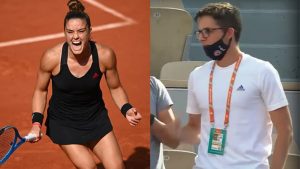For 19-year-old Iga Swiatek the French Open final on Saturday is a breakthough but 81 years ago she had a Polish predecessor, Jadwiga Jedrzejowska, who played for the title at Roland Garros.
Here are five things we know about Jedrzejowska — known as “Jed” — the most outstanding Polish player of the interwar period:
Jedrzejowska was born on October 15, 1912 in Krakow in southern Poland, the daughter of a worker. The family lived near tennis courts and she was fascinated by the sport from an early age.
Also Read: History beckons Iga Swiatek in French Open final against Sofia Kenin
When she was 10, her father made her first racket. According to a biography on the website of Polish Radio, she remembered keeping it under her pillow, the way other girls her age kept dolls.
Her female rivals refused to play against her as women’s tennis was a high-society sport. As a result, she trained mostly with men and became Polish champion at the age of 20.
Because her name was judged too difficult to pronounce, Jedrzejowska was commonly referred to in the English-speaking world as “Jed” or “Ja-Ja”.
In Poland, her nickname was “Jadzia” or “Ya-dzha”.
Also Read: Sofia Kenin downs Petra Kvitova to set up French Open final with teen Iga Swiatek
King Gustav V of Sweden, who had played with her on the French Riviera before the war, tried to get her out of war-torn Poland in 1941. She turned down the offer, and refused an invitation from Poland’s Nazi occupiers to move to Germany.
Before the war, she met Charlie Chaplin in the United States, upbraiding him for being too critical of a tennis match.
The two later became fast friends and they corresponded until his death in 1977.
She reached the final of Wimbledon in 1937 but lost against a far more experienced rival, Britain’s Dorothy Round. She remembered she was “afraid to win” and cried in the cloakroom, although she received a hero’s welcome when she returned to Poland.
Also Read: Novak Djokovic confronted again by pressures of Paris
She lost the 1939 French Open final to Simonne Mathieu but won the doubles title by teaming up with Mathieu against Yugoslav players Alice Florian and Hella Kovac. Just a few weeks later, Hitler’s invasion of Poland signalled the start of World War II.
She continued playing after the war and made it to the mixed doubles final of the French Open in 1947. She married an engineer, Alfred Gallert, and was involved with tennis for the rest of her life.
She died in Katowice in southern Poland in 1980 — at the outset of the Solidarity movement which brought down Poland’s post-war communist regime.





